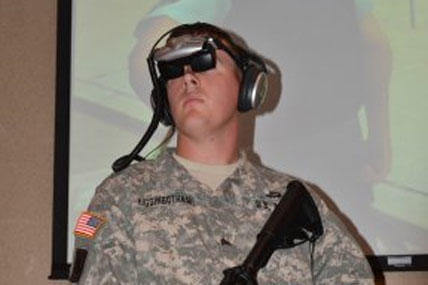FORT BRAGG, N.C. -- A study to see if the use of virtual reality therapy can help servicemembers struggling with post-traumatic stress disorder is underway at Womack Army Medical Center by Defense Department and Department of Health and Human Services professionals.
"This study is designed to show if virtual reality exposure therapy is an effective way to combat the severity and symptoms of PTSD," said psychologist Victoria Ingram, principal investigator and deputy chief of behavioral health at the medical center.
For an Army with more than a decade of combat operations and countless Soldiers who have deployed in support of those operations, PTSD is an issue the Army wants all Soldiers to be aware of.
"It's an emotional and psychological reaction to a traumatic event and is usually characterized by a life threatening situation, such as, seeing others around you die or become severely wounded," said Ingram.
Ingram, along with a team of clinical psychologists and nurses as part of the WAMC's Clinical Psychology Service and the National Center for Telehealth and Technology held an open house, Aug 9, at the Airman and Family Readiness Center at Pope Field. They displayed different types of virtual reality trainers along with biometric data collection processes they would use during the research trial.
Included among the virtual reality trainers was a stand-up VR trainer, where the patient stands on a vibrating platform and holds a simulated M-4 assault carbine, and a convoy operations trainer, said clinical psychologist Anne Edens. The different trainers are used to simulate the traumatic events servicemembers have gone through that trigger PTSD symptoms.
"It's very believable," said Staff Sgt. Chuck E. West, a reservist with the 320th Medical Company (Hospital). "I have two combat deployments, and I think this would be very beneficial because they have the ability to gradually expose Soldiers to more stressful situations."
"During a combat deployment, stressful and sometimes traumatic experiences are inevitable," said Sgt. Arick E. Higginbotham of the 108th Air Defense Artillery Brigade. "But as Soldiers, the common way to deal with this is to push it aside and drive on."
The "push it aside and drive on" aspect of soldiering is unique and contributes to the move into using virtual reality therapy, said Ingram.
"Soldiers have an inherent ability to emotionally disconnect from traumatic events in order to stay alive and complete the mission down-range," she said. "It's for this reason traditional therapy is not as effective on our military population as it is on our civilian one. With virtual reality, the hope is to put servicemembers back in the moment, however in a safe environment, in order to reach the emotional connection necessary to make treatment and recovery possible."
Edens said she hopes the technology is more appealing to Soldiers, and will encourage them to participate.
"We hope it's more attractive to people who don't want to sit down and hear 'how did that make you feel?'" Edens said.
Over the next two years, professionals are looking to work with around 350 Fort Bragg Soldiers to show scientific proof that the use of virtual reality is a viable option for the treatment of PTSD.





























